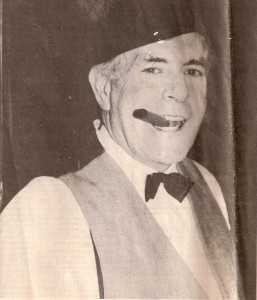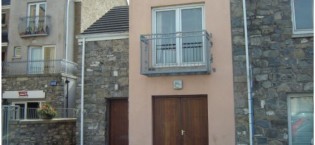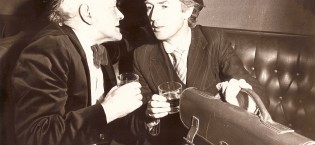Columb’s Columns
 The squirrel-like vigilance with which Columb Mc Bride has collected the memorabilia of nearly forty years’ involvement in amateur drama has at last achieved usefulness. The bulging scrap book of programmes, paper cuttings, and photographs is now utilised as a guide map on a journey through a remarkable career. It is a fascinating treasure trove of memories, and it graphically illustrates Columb’s passion for drama. Each turn of a page unlocks a fresh story – a favourite play, a long lost friend, a party in London, a calamity in Cavan. It’s all between two black covers, as close as one could wish to get a record of one man’s life; as close, indeed, to a history of drama in Sligo.
The squirrel-like vigilance with which Columb Mc Bride has collected the memorabilia of nearly forty years’ involvement in amateur drama has at last achieved usefulness. The bulging scrap book of programmes, paper cuttings, and photographs is now utilised as a guide map on a journey through a remarkable career. It is a fascinating treasure trove of memories, and it graphically illustrates Columb’s passion for drama. Each turn of a page unlocks a fresh story – a favourite play, a long lost friend, a party in London, a calamity in Cavan. It’s all between two black covers, as close as one could wish to get a record of one man’s life; as close, indeed, to a history of drama in Sligo.
The soft northern accent indicates that he’s not a native Sligonian, though he has lived here now for nearly twenty years and is immersed in the community, not alone through drama but in other spheres as well. But that accent is slightly misleading because, in fact, Columb was born in Dublin. But that’s not even half the story. His early childhood was spent in Elphin, Co. Roscommon, before the family moved to Ballycastle, Co. Antrim, and later to Belfast.
It was as a teenager in Belfast that he first contracted the drama bug. Former friends from the Ballycastle Youth Club came to Belfast to perform a play, and Columb’s loyalty dictated that he should go along to lend support. He was, as they say, “bowled over”, and to such an extent that he went back to his own youth club and demanded that they form a drama group. And so the Holy Family Youth Club made its dramatic debut with “Uncle Dan” in 1956. The programme is still in mint condition, and as he surveys the cast, Columb takes great pride in revealing that two of the players, Marcus Mulholland and Maureen Dow have gone on to become professional actors. Another member of the group, who did not win a part in that first production, was Oliver Maguire, who is now well known to television soap fans as the grumpy pub owner in RTE’s “Fair City”.
Columb continued acting for a few more years, but when he left Belfast to work in Dublin for nine years, the interest waned. A job, a wife, a young family and a mortgage provided enough real-life drama. It wasn’t until he came to live in Sligo in the early seventies that the spark was re-kindled. He recalls being at a function in the Sligo Park Hotel and, for the sake of conversation amongst new people who happened to be members of the local drama circle, he casually remarked that he had done some acting as a young fella. Two days later, a man he had never met before marched into the bank where he worked and made him an offer he couldn’t refuse. “I believe you do a bit of acting”, was Liam Mc Kinney’s introductory remark. It was the beginning of what was to become a close friendship, with Columb unswerving in his respect for a man he says was “Years ahead of his time”. He goes further. There would not be a theatre in Sligo today but for Liam Mc Kinney – and that comes from a man who was closer to the coal-face of the Theatre for Sligo campaign which was eventually to pave the way for the establishment of the Hawk’s Well.
Columb’s first play with the Drama Circle was Steinbeck’s “Of Mice and Men”, directed by Liam Mc Kinney, in 1973. And what a cast – Mickey Kilcoyne, Cormac Sheridan, Lionel Gallagher, Padraig Foran, Frank Brannigan, Manus Shields, John Caheny, Dee Gallagher, George Molloy. Interestingly, Messers Kilcoyne and Caheny were also making their inaugural appearance in that play. Columb still has the adjudicator’s report from one leg of the festival circuit, in which his portrayal of “Slim” is described as a “beautifuly relaxed, sensitive performance”. It is an accolade which could be applied to practically every role he has played since, for sensitivity and unflappable assurance are among his chief attributes as an actor. He needed to call on his entire range of ability in his next play for the Drama Circle in 1974, “Men Without Shadows”, which was so realistically brutal that its success was gauged by the number of people who walked out during performance, unable to take any more.
“It was a French play about members of the Resistance being interrogated by the Nazis, and we did it in an Irish context. It was very realistic, very brutal and every night there would be people walking out. It got to the stage where we were judging how good we were by the numbers who left before the finish”, Columb recalls. Again, there was a top class line-up, with Tony Wehrly making a rare but memorable appearance, and Maria Mc Dermottroe and Robert Burnside joining the regulars. It swept the boards on the festival circuit, winning awards and critical acclaim in equal measure.
It was about this time that the Theatre for Sligo campaign began, the main fund-raising being undertaken in summer theatre which fully stretched the energy and imagination of the Drama Circle. For instance, in a four months spell in 1976, the Drama Circle produced no fewer than eight plays. Not only does such an output underline the massive contribution which the group made to the theatre campaign, but it also testifies to the healthy state of amateur drama in the area in the 1970s. In any event, Sligo eventually got its theatre, perhaps not in the way the early pioneers originally envisaged, but Columb is happy that the work of those people, particularly Liam Mc Kinney, has been acknowledged.
As well as his long list of work with the Drama Circle, Columb has also played with Everyman, the Sligo Musical Society and the Fun Company, adding singing parts to his repertoire along the way. “I’m no great singer”, he confesses,. “Even now, I can see the rest of the cast waiting nervously to see if I’m going to hit the right note”. Each show has been memorable in its own right, so its unfair to ask him to nominate a favourite – he has clearly loved and enjoyed them all. But certain shows do stand out He recalls the Drama Circle’s “A Man for All Seasons”, performed outdoors on a specially constructed stage in the Retreat House grounds. Meticulous in his planning, Liam Mc Kinney had consulted the Met Office and had been sufficiently re-assured to press ahead with the show at the end of May. It rained the proverbial cats and dogs, and the set was blown down in a gale one night. Nonetheless, it proved extremely popular with the punters, so a re-run was organised. No chances were taken this time, however. An indoor arena was found at Summerhill College. Guess what? The sun split the stones for the entire run.
Other favourite roles include the Drama Circle’s “Antigone”, the last play they toured with; Everyman’s “Translations” and “A Crucial Week in the Life of a Grocer’s Assistant”, which toured London. And there’s a special place in the memory book for the Fun Company’s “Annie”, in which he played the lovable “Daddy Warbucks”, in both the 1985 and 1992 productions. In all, a total audience of nearly 10,000 have seen him in that role. He’s currectly appearing in the Half Door Production Company’s summer offering “Inish” at the Hawk’s Well and, true to for, is loving every minute of it. “It’s a first class show for tourists and locals alike”, he says. “It’s light, bouncy entertainment with some really catchy tunes which people will be whistling leaving the theatre”.
In the real world, Columb works as the supervisor on a FÁS scheme at the Hawk’s Well. For a man devoted to theatre, this must surely constitute a glimpse of paradise. And nobody deserves it more.
An interview with Columb Mc Bride by Jim Gray in The Sligo Champion, Showstopper Series, July 2nd, 1993
Tags: History, Reflections







